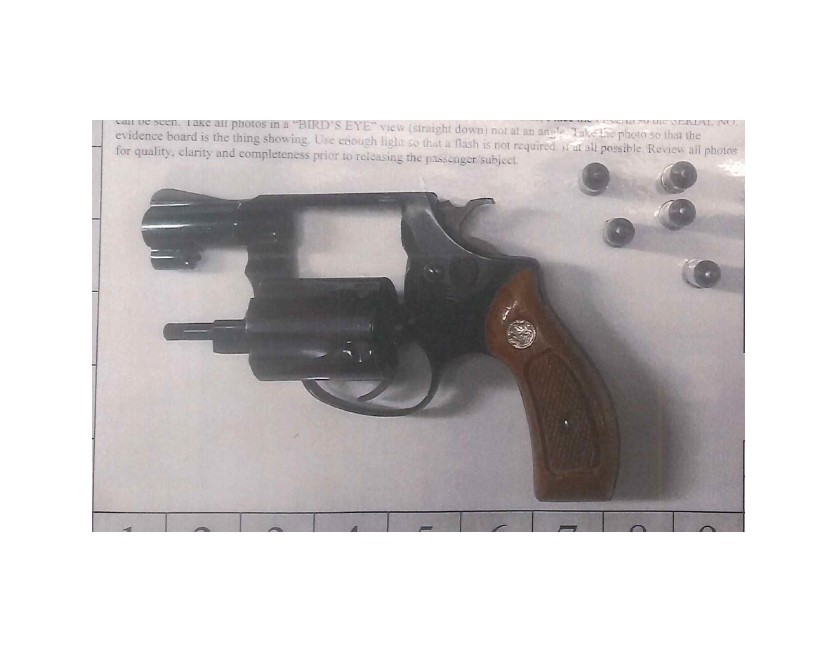 This loaded handgun was detected by TSA officers in a passenger’s carry-on bag at Jackson-Medgar Wiley Evers International Airport (JAN) on Jan. 28. (TSA photo)
This loaded handgun was detected by TSA officers in a passenger’s carry-on bag at Jackson-Medgar Wiley Evers International Airport (JAN) on Jan. 28. (TSA photo)
Jackson, Miss. - A record number of passengers brought firearms into the Transportation Security Administration (TSA) checkpoints at Jackson-Medgar Wiley Evers International Airport (JAN) in Jackson, MS, last year.
TSA officers intercepted 35 firearms in 2023 at JAN, exceeding the previous record of 24 reached in 2022. That represented an escalation of 46 percent. Most were loaded and many had ammunition chambered. Firearms were intercepted as well at four other Mississippi airports with seven at Gulfport-Biloxi International, five at Golden Triangle Regional, two at Tupelo Regional and one at Mid Delta Regional. Since 2013 TSA officers have stopped 278 firearms across the state from being brought into the cabins of aircraft.
If you are going to travel with your firearm it must be in your checked bag, unloaded and in a locked hard-sided case. You must declare it to the airline at check-in. Be sure you know exactly what the firearm laws are on each side of your trip or you may be heading to jail instead of to your vacation or business trip. Firearms may not be legal to transport even in checked baggage in some jurisdictions.
“Every traveler is responsible for knowing where their firearm is before entering TSA’s federal security checkpoint and that must not be on their person or in their carry-on,” said Kim Jackson, TSA’s Federal Security Director for the state of Mississippi. “This is both a security and a safety concern. With so many of the intercepted firearms loaded, an accidental discharge could have tragic results.”
TSA officers have stopped one firearm at GPT and four firearms at JAN already this year. The latest were last Monday when a 60-year-old male brought a loaded .38 caliber Ruger and last Tuesday when a 60-year-old woman brought a loaded Smith and Wesson, with ammunition chambered, to the checkpoint at JAN.
Many of the passengers who brought firearms to the security checkpoint were arrested or issued notices to appear in court. Regardless of whether the individual is arrested or cited by our law enforcement partners, passengers face a civil penalty imposed by the TSA that can reach nearly $15,000. If the traveler is in the TSA PreCheck® program, those privileges will be lost for a period of time, possibly permanently.
Here are five tips for getting through the TSA checkpoint as quickly and efficiently as possible.
Tip 1: No firearms in carry-ons. Firearms must be in checked baggage. All firearms must be properly packed and declared to the airline at check-in, which means unloaded and in a locked, hard-sided case. Contact your airline for additional guidance. And it is your responsibility to know what the firearm laws are on both sides of your trip.
Tip 2: Leave all prohibited items at home. To reduce the likelihood of a bag search at the checkpoint, search your own bag before leaving home. Unsure if it’s allowed: use the “What Can I Bring?” link on TSA.gov.
Tip 3: Prepare for the security checkpoint. Have a valid ID card readily available. If you are traveling with a carry-on bag follow the liquids, gels and aerosols 3-1-1 rule of 3.4 ounces or less for each item and the items should be placed in a one-quart-sized bag, one bag per passenger. To simplify your screening and even before entering the checkpoint it is best to put your phones and any other content of your pockets into your carry-on rather than into a bin in the checkpoint.
Tip 4: Help is available. Get live assistance by tweeting your questions to @AskTSA in English or Spanish or via Facebook Messenger. You can also call the TSA Contact Center at 866-289-9673.
Tip 5: Enroll now in TSA PreCheck. Travel with ease by enrolling in TSA PreCheck and avoid removing shoes, belts, liquids, laptops and light jackets. Most new enrollees receive a known traveler number within five days, and membership lasts for five years.
